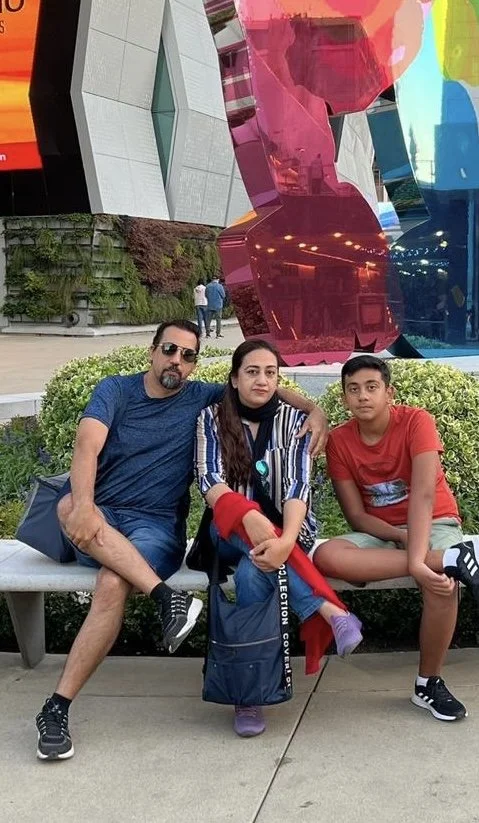The Story of OSCOD’s Afghan Project
In August 2021, as the world watched the chaotic withdrawal of U.S. troops, the fall of the Afghan government, and the swift rise of the Taliban, Ambassador Tom Miller felt deeply troubled. As CEO of IESC (2010-2018), a nonprofit with two large business and infrastructure projects in Afghanistan, Miller had visited the country two dozen times. Disappointed and angry at how the U.S. withdrawal was handled and seeing tens of thousands of desperate Afghans swarming Hamid Karzai Airport in a frantic attempt to escape, he vowed to “do something.” But at the time, he had no clear plan.
Just days later, an unexpected message arrived from Tarana Amini, a former IESC employee living in Sacramento, California, since 2018. Tarana had earned recognition in Afghanistan for her exemplary work and was desperately seeking help to evacuate her "family." She sent pleas to all her LinkedIn contacts, begging for assistance. For Tom, this was the opportunity he had been waiting for. Little did he know it would evolve into a three-year project demanding nearly full-time attention, persistence, creativity, a lot of money he didn’t have, and the use of his diplomatic connections.
In July 2021, at a taverna in Athens, Tom had an unexpected encounter with the son of the former Army Attaché when Tom had served as U.S. Ambassador to Greece. This young man, Nick Calbos, who had once interviewed Miller for his high school newspaper in 2004, was now a West Point graduate who had fought in Afghanistan. Before leaving Afghanistan, Nick had promised an Afghan Army colonel, with whom he had served and who had saved his life more than once, that if the situation became too dangerous, he would help the colonel and his family of 14 escape the tyranny of the Taliban.
So, Nick Calbos and Tom Miller joined forces to help endangered Afghans flee the country. But how? There were immediate challenges; since there was no U.S. embassy in Kabul, there was no chance of obtaining a U.S. visa there, and it was difficult to travel to any other country except Pakistan. Tom called in a favor from his longtime friend, the Prime Minister of Greece, to issue visas to imperiled Afghans to provide temporary asylum in Thessaloniki while awaiting clearance to enter the U.S. As soon as they could, many of these at-risk families, who had been hiding from the Taliban, traveled overland to the Greek Embassy in Islamabad to receive their Greek visas before flying to Thessaloniki.
A local Greek NGO generously offered temporary housing for the refugees while they awaited U.S. visa approvals, medical screenings, and security clearances. No one could predict that this delay would last for well over a year for most families and sometimes even two years for others. And the offer to provide free lodging, food and services abruptly ended with the Russian invasion of Ukraine in 2022. Focusing on aiding refugees fleeing the war in Ukraine, the Greek NGO maintained their offer to house the Afghans but notified Tom that the costs of shelter, food, counseling, transportation, etc. would not be free. Where was this funding going to be obtained? Through a partnership with another NGO, No One Left Behind, and two groups of extremely generous donors, these Afghan families were cared for during the extended waiting period. Nick made several trips to Thessaloniki to check on the Afghan families and liaised with the local Greek NGO to ensure they were receiving the services they needed.
Most of Tarana’s “family,” a group whose numbers grew by the month, held Special Immigrant Visas from the U.S., granted to those who had helped the U.S. effort in Afghanistan. However, many held “lesser” status. Tom leveraged every contact he had—cold calling, following leads, and using connections of connections—to expedite the visa process.
Family by family, these 58 Afghans were granted their visas and clearances, and now three years later, all 58, most of whom had been supported in Greece by generous donors, are safely settled in Sacramento, Cleveland, and northern Virginia. Without this convergence of valuable resources, these refugees would still be living under the oppressive Taliban control in Afghanistan and suffering every day. We are so grateful for the support of everyone who helped.
In light of the above, people ask if we are finished. Despite hundreds of thousands of Afghans who want to escape, especially girls and women still living under the draconian Taliban regime, the short answer is, “Probably yes.” First, the option of temporary residence in Greece was a one-off opportunity that is no longer available. Second, the Taliban has made it much more difficult to leave Afghanistan compared to 2-3 years ago. Finally, we learned about the meaning of “extended family” in Afghanistan. A commitment to help one person often meant aiding many others. We made a promise to bring these 58 individuals to the U.S. and were clear that, with a few rare exceptions, they would be on their own once they arrived.
We are pleased to see them thriving in their new lives in America. The children are all in school and speaking English. Most of the adults are employed and self-supporting.







